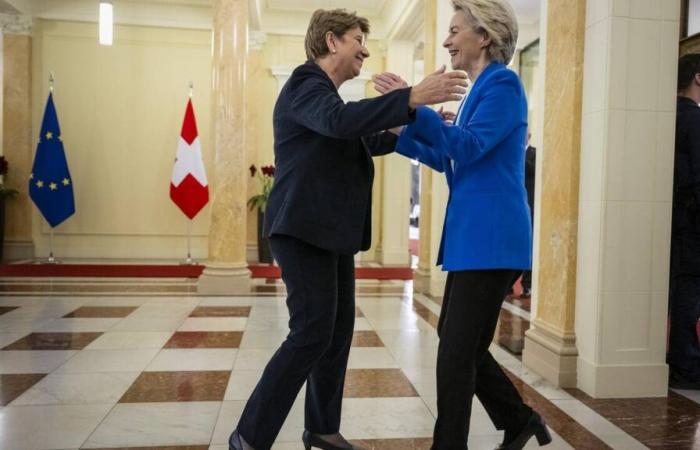The 2024 project includes several new features that did not appear in the 2018 Institutional Framework Agreement. It involves both establishing new institutional rules for certain existing bilateral agreements and, a new element, concluding new agreements (electricity, public health and consumer protection). Due to its political importance, we will focus here mainly on the institutional aspect.
A new vertical logic to avoid the guillotine effect
There are notable differences in form between the 2024 project and that of 2018. The latter was designed as a horizontal treaty. It provided for a single institutional framework. It was planned to apply it to five already existing bilateral agreements, as well as future agreements.
The 2024 project takes us from a horizontal logic to a vertical logic. In other words, each of the five pre-existing bilateral agreements, as well as each of the new agreements, is provided with its own institutional framework. Concretely, however, the general result is similar to that obtained in 2018.
So what is the advantage of this new vertical approach? First, it raises the specter of a sort of “super-guillotine”. Indeed, a possible denunciation of the 2018 Framework Agreement would have had cascading consequences on several other bilateral agreements which would have been automatically repealed. Secondly, it allows some adaptations to take into account the specificity of the agreements, particularly in terms of the adoption of relevant European law by Switzerland.
If the general form changes between the 2018 project and that of 2024, it must nevertheless be emphasized that the fundamentals remain the same.
Dynamic resumption of EU law, but disputes settled by an Arbitral Tribunal
First, Switzerland is committed to dynamically taking up the development of relevant EU law with a few exceptions (see below).
Second, disputes between Switzerland and the EU will have to be settled before a joint arbitration tribunal. Exit therefore the logic of “political” settlement which prevailed until now and which had the consequence that bilateral disputes often remained pending. As was the case in the 2018 draft, the arbitral tribunal remains bound by the judgments of the Court of Justice of the EU, if the dispute concerns the interpretation and application of EU law.
Concerning Switzerland's dynamic takeover of the development of relevant EU law, there are nevertheless some interesting exceptions in the 2024 project. They were fiercely negotiated by Switzerland.
For example, when a new European provision constitutes a “social regression” compared to Swiss law, Berne could refuse to incorporate it into its legal order. However, this exception only concerns posted workers.
Note that the notion of social regression is not defined and could, of course, be subject to contradictory interpretations between the EU and Switzerland. In this case, the joint arbitral tribunal would decide.
Elements of flexibility in the social file…
Another example, we remember that the 2018 draft agreement was the subject of criticism because it could have implied a resumption by Switzerland of the entire Directive on the rights of EU citizens.
The 2024 text is more precise and emphasizes that several elements of this directive must not be necessarily incorporated by Switzerland, in particular those which prevent the automatic expulsion of “foreign criminals” or those which could lead to “social tourism”.
We also remember that the 2018 agreement had generated numerous controversies concerning the removal of the deposit required from companies employing posted workers. As a reminder, this provision of Swiss law allows pressure to be exerted to ensure that the rules on posted workers are respected. The 2024 agreement does not bring about much change in this area. He just reiterates that a deposit can only be required in the case of fraudulent companies.
Another controversy concerned the reimbursement of fees paid to these same posted workers. European law provides that they correspond to the rates of the worker's country of origin, generally lower than those of Switzerland. The 2024 project does not specifically address this issue. The Federal Council states cryptically that “Switzerland will fully exploit the room for maneuver offered by the EU directive on the posting of workers”. A way of saying that we could not apply EU law because several EU states are already distancing themselves from it.
…and in the immigration file
Beyond the institutional questions linked to the resumption of EU law, Switzerland also took advantage of the negotiations to obtain some changes in the Agreement on the Free Movement of Persons (ALCP). Previously, the safeguard clause to limit immigration in the event of serious economic or social difficulties could only be activated if Switzerland and the EU agreed to it. From now on, Switzerland can activate this clause unilaterally under the control of the arbitral tribunal. The EU, however, reserves the right to take proportionate compensatory measures.
Finally, regarding Switzerland's participation in intra-European cohesion, which was not mentioned in the 2018 agreement, Switzerland undertakes to pay, from 2030, a contribution of 350 million francs per year against 130 currently. Until now, this contribution was not included in any bilateral treaty; a simple memorandum did the trick.
In conclusion, the 2024 draft agreement clarifies certain points which were the subject of concerns in 2018. It removes certain ambiguities and offers more explicit guarantees to Switzerland, particularly in terms of autonomous management of immigration. In this sense, we can say that it is more favorable to Swiss interests, without however bringing revolutionary new features.






